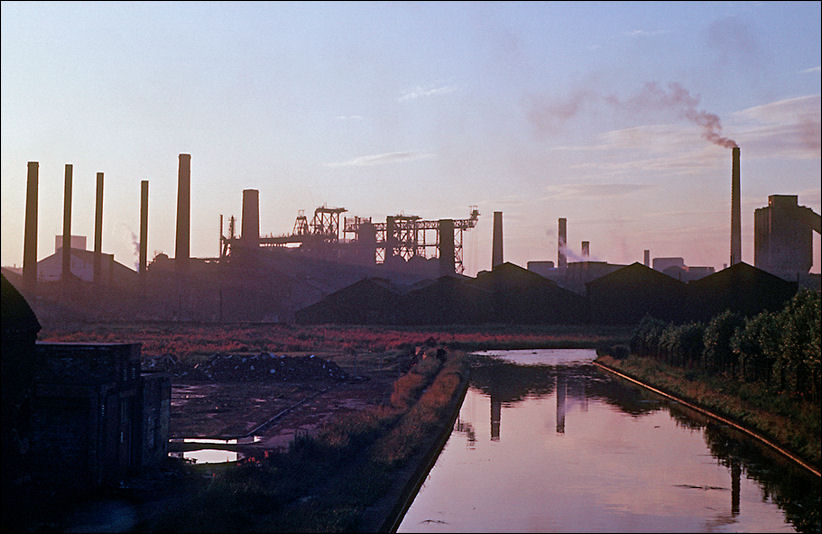
The Trent & Mersey Canal as
it passes through Shelton Iron & Steel Works c.1968
photo: Ken & Joan Davis

Shelton Works at Etruria - an
oil painting by Hesketh Hubbard
English Rivers & Canals
Hesketh Hubbard was the 1950 President of the
Royal Society of British Artists

aerial photo of the Shelton
Works - early 1950
The Trent & Mersey Canal runs through the centre of the works
photo: 150 Years of the Shelton Works
-
At
this time the workforce amounted to more than 10,000.
-
There
were five coalmines on the site, steelworks and rolling mills, a
coking plant, blast furnaces and a bi-product factory.
|

top left of the
picture
-
The
Trent and Mersey Canal (originally called The Grand Trunk Canal)
passes through the works on its way to Middleport &
Longport.
-
At
the top left is the original rolling shed.
-
The
Blast furnaces and steelmaking plant occupy the bottom half of the
photo.
|

top right of the
picture
-
In
the centre of the picture is a slag tip - the molten slag from the
furnaces is hauled up to the top and tipped out of the slag pans -
at night time this resulted in a red glow which could be seen for
miles around.
-
In
the bottom half of the photo is the coking and by-products
plant.
-
In
the bottom left is the steel works offices - originally Josiah
Wedgwood's Etruria Hall, built in 1771.
-
The
Wedgwood family had abandoned Etruria Hall, which overlooked the
works, back in the 1840s because of the increasingly dirty
atmosphere. The mineral railway lines ran close to the Hall adding
to the noise and
polution.
|

bottom left of the
picture
-
At
the bottom right is the Potteries Loop Line and also mineral
lines.
-
In
the bottom left can be seen the Fowlea Brook 'foul by name and foul
by nature' - it is notably affected by pollution from the industrial
areas through which it passes. It enters the city near Goldendale
pools and is then culverted for most of its length through Longport
and Etruria to Stoke, where it joins the River Trent.
|

bottom right of the picture
-
The
pottery factory was Wedgwood's Etruria Works, built in 1769. The
canal which runs past the works was opened in
1777.
-
Because
of subsidence from the underground mining and contamination of the
pottery glaze through polution from the iron & steel works
Wedgwood's built a new factory at Barlaston - from 1940 to 1950
production was gradually transfered from Etruria to Barlaston.
-
Production
ended at the Etruria potworks on 13th June 1950. This photograph was
taken just before the closure as evidenced by the couple of smoking
bottle kilns.
-
At the
top of this section of the photograph are the steel rolling sheds.
The Potteries Loop Line Railway runs between the steel works and
pottery works.
|




contents: 2011 photos
![]()






